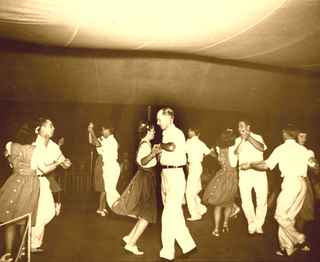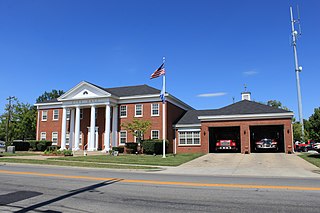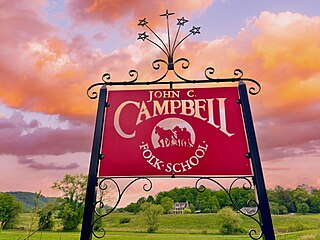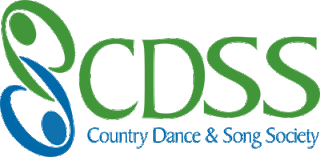
Contra dance is a form of folk dancing made up of long lines of couples. It has mixed origins from English country dance, Scottish country dance, and French dance styles in the 17th century. Sometimes described as New England folk dance or Appalachian folk dance, contra dances can be found around the world, but are most common in the United States, Canada, and other Anglophone countries.

A country dance is any of a very large number of social dances of a type that originated in England in the British Isles; it is the repeated execution of a predefined sequence of figures, carefully designed to fit a fixed length of music, performed by a group of people, usually in couples, in one or more sets. The figures involve interaction with your partner and/or with other dancers, usually with a progression so that you dance with everyone in your set. It is common in modern times to have a "caller" who teaches the dance and then calls the figures as you dance. Country dances are done in many different styles.

A square dance is a dance for four couples, or eight dancers in total, arranged in a square, with one couple on each side, facing the middle of the square. Square dances are part of a broad spectrum of dances known by various names: country dances, traditional dances, folk dances, barn dances, ceilidh dances, contra dances, Playford dances, etc. These dances appear in over 100 different formations, of which the Square and the Longways Set are by far the most popular formations.

Berea is a home rule-class city in Madison County, Kentucky, in the United States. The town is best known for its art festivals, historic restaurants and buildings, and as the home to Berea College, a private liberal arts college. The population was 15,539 at the 2020 census. It is one of the fastest-growing towns in Kentucky, having increased by 27.4% since 2000. Berea is a principal city of the Richmond−Berea Micropolitan Statistical Area, which includes Madison and Rockcastle counties. It was formally incorporated by the state assembly in 1890.

Hayesville is a town in Clay County, North Carolina, United States. The population was 311 at the 2010 census. It is the county seat of Clay County.
William Bradley Kincaid was an American folk singer and radio entertainer.

The New England Folk Festival is an annual weekend festival of traditional dance and music. It takes place in the Boston, Massachusetts region each spring. It is conducted by the New England Folk Festival Association. Both the festival and the association are colloquially known by the abbreviation NEFFA. NEFFA is a participatory festival; attendees are encouraged to participate in dancing, singing, musical jam sessions, and other activities. It is run by volunteers and all the performers are volunteers as well.

Jean Ruth Ritchie was an American folk singer, songwriter, and Appalachian dulcimer player, called by some the "Mother of Folk". In her youth she learned hundreds of folk songs in the traditional way, many of which were Appalachian variants of centuries old British and Irish songs, including dozens of Child Ballads. In adulthood, she shared these songs with wide audiences, as well as writing some of her own songs using traditional foundations.

Appalachian music is the music of the region of Appalachia in the Eastern United States. Traditional Appalachian music is derived from various influences, including the ballads, hymns and fiddle music of the British Isles, and to a lesser extent the music of Continental Europe.

The John C. Campbell Folk School, also referred to as "The Folk School", is located in Brasstown, North Carolina. It is the oldest and largest folk school in the United States. It is a non-profit adult educational organization based on non-competitive learning. The Folk School offers classes year-round in over fifty subject areas including art, craft, music, dance, and nature studies. Established in 1925, the Folk School's motto is "I sing behind the plow".

Olive Dame Campbell (1882–1954) was an American folklorist.

Traditional square dance is a generic American term for any style of American square dance other than modern Western. The term can mean (1) any of the American regional styles that existed before around 1950, when modern Western style began to develop out of a blend of those regional styles, or (2) any style that has survived, or been revived, since around 1950. The term Traditional Square Dance is also used in England to refer to dances collected from villages in the first half of the 20th century.
Ted Sannella was a professional square dance, contra dance and international folk dance caller and choreographer who was active in the region surrounding Boston, Massachusetts, in the United States. He was a seminal figure in the contra dance folk revival in the United States in the mid to late 20th century.
Billy Edward Wheeler was an American songwriter, performer, writer, and visual artist.

Brasstown is an unincorporated community located mostly within Clay County, North Carolina, United States, though roughly one third of Brasstown is within the adjacent Cherokee County. Brasstown Creek travels through the community and separates the two counties.

The Country Dance and Song Society is a nonprofit organization that seeks to promote participatory dance, music, and song with English and North American roots.

Ralph George Page was an American contra dance caller. He was influential in spreading it from New Hampshire to the rest of the United States and other countries, and was recognized as an authority on American folk dance overall.
Loyal Jones was an American folklorist, Appalachian culture scholar, and writer.
Tony Parkes was an American professional square dance, contra dance and folk dance caller and choreographer who was active in the region surrounding Boston, Massachusetts, in the United States. He wrote the book Contra Dance Calling – A Basic Text in 1992 and updated it in 2010.
May Gadd was an internationally-known expert on American and English country dance. Gadd was born in Chichester, England in 1890. She became a physical education instructor but after seeing a dance in a London theatre, attended Cecil Sharp's summer camp in 1915.














